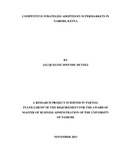| dc.description.abstract | Strategy is an essential part of any effective business plan. By using an effective competitive strategy, a company finds its industry niche and learns about its customers. Porter asserts there are three basic business strategies; differentiation strategy, cost leadership strategy and focus strategy and a firm performs best by choosing one strategy in which to concrete. In Kenya, retail industry has experienced rapid growth hence purpose of the study is to establish competitive strategies used by supermarkets in Nairobi, Kenya. The study was guided by the following objectives: to determine the Competitive Strategies adopted by supermarkets in Nairobi Kenya and to establish the challenges faced by Supermarkets in implementing competitive strategies formulated. The study adopted a descriptive survey design. The population of this study was the 26 supermarkets incensed by the Nairobi City Council 2011. No sampling was done and all supermarkets incensed in the survey. Data collection was done through questionnaire which was administered to the senior managers of the supermarkets. Data was analyzed using Statistical Package for Social Sciences (SPSS). This study used descriptive statistics such as mean scores, percentages and standard deviation. The study established that supermarkets use differentiation strategies such as market and innovation strategies in a bid to remain competitive in the market only to a little extent. It was established that service line, geographical areas and customer group/buyer characteristics inform focus strategies by supermarkets by a large affects performance of the supermarket to a little extent. There were also challenges that were associated with implementation of competitive strategy and respondents cited high cost of capital and inability to meet up with changes in demand variability. Another challenge was creation of transformation strategies to turn vision and mission into reality and changing market and product condition moment by the moment. It was also revealed that it was not easy to come up with long-term strategies due to dynamics of the market and the fact that the cost of implementing some strategies was prohibitive. The study recommends that foremost, supermarkets should combine retail market analysis and to analyze strategic challenges. Secondly, supermarkets should follow best practices such as having a visible and effective communication process spearheaded by an experienced person that ensures that information on strategy implementation is timely communicated across the organization. The study was limited to the cited categories of strategies due to limited time provided. However, there may be other great strategies which can be employed by the organization to keep a competitive edge that have not been covered in this study. The study is also limited to supermarkets in Nairobi Kenya and hence the findings cannot be generalized to entire retail industry. This is due to difference in systems, organizations structures and capabilities. There is therefore need for more study to be done to identify competitive strategies being employed by supermarkets all over the country. | en |

